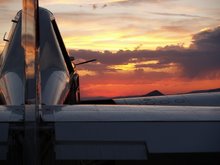Just yesterday, I was complaining—as I often do—about the Chutes and Ladders like advancement in aviation, at least for pilots. By the time you climb to the top of one ladder, an unfortunate roll of the die or twist of fate funnels you down a chute so fast it tests the integrity of your pants. (Old Navy jeans will melt like a plastic plate on a gas grill.) After all the flight training and lingering student loans, a mere slip on a couple of ladder rungs—rather than transgressing to airplane washer—would be appreciated.
While enjoying a fixed state of pilot employment, however, the smell of melting denim brought to mind aviation's career slide. Other aromas bring about fonder memories, like my association with the smell of cotton candy and stepping in elephant poop. But that’s not my point. It seems aviation is not the only profession with dramatic career peaks and valleys. Even prior recognition or sucess, writing has them too.
For months I have wanted to spruce up the blog and turn it into a real Web site. You can imagine my delight, then, when I united my two-year-old dot-com address with a hosting site. Anybody who is anyone has a dot-com. Having to type blogspot in the address makes people wash the stain of amateur from their fingertips (so they tell me). Besides, you get a ton of cool features with WordPress like searchable tags, categorized articles, and social media links.
My excitement over the new Web site, however, ended shortly after uploading a WordPress template that—in finding and selecting—took years off my life. In trying to change something as simple as font, I slid down the steepest chute and into a burning inferno. And no, the combustion of my pants (damn Old Navy) did not spark the fire. It was burning, of immeasurable magnitude, before I got there, like the pit of despair or Hell.
WordPress provides a new dimension. Gone are the days of user-friendly Blogger templates, familiar ground, and acceptable presentation. There, I wield my computer illiteracy and close my eyes when trying to conquer code. Perhaps I should have taken my counselor's advice in high school and became a computer programmer after all. I bet techies only bump their chins on the ladder when their foot slips during ascent.
Friday, August 21
Monday, August 10
Pigeon Latin
I know. The span between posts is somewhat lengthy and not at all what I promised two and a half months ago. But my excuse is valid. It takes time to dispense retardant: to save grass, sagebrush, and pine from igniting in an advancing, wind driven inferno. Hey, somebody has to do it. Four days ago, however, Mother Nature took over—as she always does—and, after 24 hours of rain, saturated us with negativity.
Amidst our construction of a life raft, The Arc of 2010, a lone pigeon arrived like a diverted airliner.
I refer to it as a “he” only by assumption. It could be a female for all I know. The deal with pigeons is that the casual observer cannot decipher its sex—with or without picking it up. Yeah, so what, you say. Pigeons are just winged rats: feathered nuisances. But I—which is true for most pilots—have an exaggerated appreciation for birds, even pigeons. Regardless its sex (please appreciate, men, the teeth marks on my tongue from omitting men-and-directions jokes), this pigeon was horribly lost.
Do I take out an ad in the local classifieds? LOST PIGEON FOUND but NOT IN POSSESSION. RIGHTFUL OWNER CAN CLAIM WITH ACCURATE DESCRIPTION.
In the four seasons I have worked out of this airbase I have never seen a pigeon. Nor have I seen one wandering around the few blocks that constitute town. I might as well have witnessed a baby croc scampering across a relatively cool tarmac found here in the Pacific Northwest.
My concern for the pigeon heightened when he hobbled over grass tufts toward me. If I had fallen over, stiff like a tree, I would have squashed him. That's how close he came. The pigeon sat his plump body on the grass. His eyelids became heavy; blinks grew long. As I finished my cell phone conversation, the pigeon piped in with his own language. His call was barely audible but I could see the feathers along his throat ripple. What was he saying?
He wasn't scraggly like one imagines a displaced animal. His robustness demonstrated health, an ankle bracelet signified that he held someone's (private or agency) interest. And he was fairly tame. My friend, also a pilot, tried to catch him later that day. “He’ll let you get pretty close,” I said. Through that exercise we discovered, at least, that the pigeon could fly.
Day after day, I find him somewhere on the asphalt that makes up the ramp, a target for the disadvantages I have imposed upon him. He looks so lonely, out of place, lost, vulnerable. Despite my failed attempts to feed him whole-wheat bagel crumbs and Aquafina bottled water, he seems to be doing quite well.
The pigeon, I realized today, represents me. I am all too familiar with loneliness, vulnerability, and discomfort with my surroundings and in my own skin. Instead of trying to drown anxieties with bread crumbs, fluids, and obssesive exercise, perhaps the answers can be found in the simplicity of observing. Just be. The goddamn pigeon can do it.
The band The White Stripes have a song loosely based on a squirrel. In their and the pigeon's honor … “Be like the pigeon, girl. Be like the pigeon.”
Amidst our construction of a life raft, The Arc of 2010, a lone pigeon arrived like a diverted airliner.
I refer to it as a “he” only by assumption. It could be a female for all I know. The deal with pigeons is that the casual observer cannot decipher its sex—with or without picking it up. Yeah, so what, you say. Pigeons are just winged rats: feathered nuisances. But I—which is true for most pilots—have an exaggerated appreciation for birds, even pigeons. Regardless its sex (please appreciate, men, the teeth marks on my tongue from omitting men-and-directions jokes), this pigeon was horribly lost.
Do I take out an ad in the local classifieds? LOST PIGEON FOUND but NOT IN POSSESSION. RIGHTFUL OWNER CAN CLAIM WITH ACCURATE DESCRIPTION.
In the four seasons I have worked out of this airbase I have never seen a pigeon. Nor have I seen one wandering around the few blocks that constitute town. I might as well have witnessed a baby croc scampering across a relatively cool tarmac found here in the Pacific Northwest.
My concern for the pigeon heightened when he hobbled over grass tufts toward me. If I had fallen over, stiff like a tree, I would have squashed him. That's how close he came. The pigeon sat his plump body on the grass. His eyelids became heavy; blinks grew long. As I finished my cell phone conversation, the pigeon piped in with his own language. His call was barely audible but I could see the feathers along his throat ripple. What was he saying?
He wasn't scraggly like one imagines a displaced animal. His robustness demonstrated health, an ankle bracelet signified that he held someone's (private or agency) interest. And he was fairly tame. My friend, also a pilot, tried to catch him later that day. “He’ll let you get pretty close,” I said. Through that exercise we discovered, at least, that the pigeon could fly.
Day after day, I find him somewhere on the asphalt that makes up the ramp, a target for the disadvantages I have imposed upon him. He looks so lonely, out of place, lost, vulnerable. Despite my failed attempts to feed him whole-wheat bagel crumbs and Aquafina bottled water, he seems to be doing quite well.
The pigeon, I realized today, represents me. I am all too familiar with loneliness, vulnerability, and discomfort with my surroundings and in my own skin. Instead of trying to drown anxieties with bread crumbs, fluids, and obssesive exercise, perhaps the answers can be found in the simplicity of observing. Just be. The goddamn pigeon can do it.
The band The White Stripes have a song loosely based on a squirrel. In their and the pigeon's honor … “Be like the pigeon, girl. Be like the pigeon.”
Subscribe to:
Posts (Atom)



